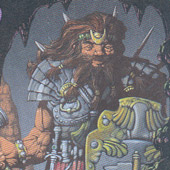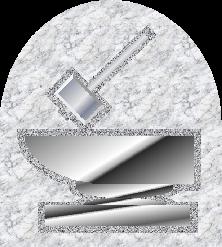
Moradin "The Soul Forger"
Greater god

ARMOR CLASS: -9
MOVE: 12"
HIT POINTS: 400
NO. OF ATTACKS: 2
DAMAGE/ATTACK: 4-40 (+17)
SPECIAL ATTACKS: Nil
SPECIAL DEFENSES: Forged weapons cannot
harm him
MAGIC RESISTANCE: 60%
SIZE: L (20')
ALIGNMENT: Lawful good
WORSHIPPER'S ALIGNMENT: Lawful good (dwarves)
SYMBOL: Hammer and anvil
PLANE: Heaven
CLERIC/DRUID: 15th level cleric/14th level
druid (777, 542) / (666, 654, 3)
FIGHTER: 20th level fighter (double specialization:
war hammer) <>
MAGIC-USER/ILLUSIONIST: Archmage
(MU19: 555, 553, 331)
THIEF/ASSASSIN: Nil
MONK/BARD: Nil
PSIONIC ABILITY: VI
| S: 25 | I: 23 | W: 20 |
| D: 21 | C: 25 | CH: 19 (25 to dwarves) |
| Com: | - | - |
-
Moradin is the head of a fairly large pantheon
of dwarven deities (The
exact members of this pantheon vary from
clan to clan.) It is said that
Moradin created the race of dwarves from
iron && mithral, forging them
in the fires at the center of the world.
The dwarves' souls entered their
bodies when Moradin blew on his creations
to cool them.
Moradin's symbol && weapon is a
huge glowing hammer.
It is a +5 weapon and strikes for
4-40 points of damage.
It cannot be used by any save the god
himself, as it disappears from others hands and returns to its owner.
He wears magical shield && armor
of his own making, which gives him AC -9.
This equipment cannot be removed from
his body by any save Moradin.
<>
Other dwarven gods include Clangeddin
(god of battle),
Dumathoin (god of secrets under mountains),
and Abbathor (evil god of greed).

Clerics Raiment Sacrifice/Propitiation
| Sphere of Control | Animal | M | F | N-H | Head | Body | Color(s) | Holy Days | Frequency | Form | Place of Worship |
| dwarves | n/a | - | - | X | silvered helm | chain mail | earthy | crescent moon | monthly | melted metals | forges & hearths |
The center of a shrine to Moradin is always
a great ever-burning hearth && forge.
Sacrifices, be they of common or precious
metal, are melted down at the forge and re-formed into shapes usable by
the clergy of Moradin.
NPC dwarven clerics
can rise as high as the 7th level, though this usu. takes hundreds of years.
<>
| < | Nonhumans' Deities | AD&&D | DDG | > |
Question: Why is the
dwarven deity Moradin non-psionic while dwarves
can be?
Answer: Again, Roger
Moore tackled this problem in his article by
suggesting that Moradin
simply doesn’t let on that he has psio-
nic powers, preferring to
keep his thoughts to himself. Without
assuming so much about what
kind of a guy Moradin is, the
question can also be approached
in this fashion:
Dwarves
and halflings are the only characters besides
hu-
mans who can possess psionic
ability, and only dwarves and
halflings of an “unusual”
nature are eligible. “Unusual,” in this
case, can be taken to include
those dwarves and halflings who
have a small amount of humAN
blooD (due to some racial inter-
mixing at some time in the
distant past), which affords them the
opportunity to have human-like
psionic ability. (Why aren’t
psionics also possible for
“unusual” gnomes, elves, half-elves,
and half-orcs on the same
basis? Because some factor which
exists only in the biological
makeups of dwarves and halflings
makes the “passing on” of
psionic potential possible.) Of
course, any dwarf or halfling
who is “unusual” in the genetic
sense would also have to
meet the standard qualifications for
having psionics — intelligence,
wisdom or charisma of 16 or
higher, and so forth.
So, to
answer the question, based on those assumptions:
Moradin isn’t psionic, just
like the vast majority of dwarves are
non-psionic, because the
god and most of the mortals who
worship him are full-blooded
dwarves with no human blood in
their background.
Question:
Concerning Moradin: “Worshiper’s Align” for him is listed as
“LG (dwarves).” Does this
mean that only LG
dwarves may worship him,
or that all dwarves and any other
LG character may worship
him?
Answer: Well, it can
mean both of those things (not at the same time),
and a few others besides.
It depends on the circumstances of
the campaign. If Moradin
is the only dwarven god in the DM’s
pantheon, then dwarves don’t
have much choice if they want
(or feel a need) to worship
a dwarven deity. Non-lawful, non-
good dwarves, such as PC
thieves
and assassins,
might have difficulty adhering
to Moradin’s standards. Howev-
er, if Moradin is the only
dwarven god, and he knows he’s the
only dwarven god, and if
those dwarven thieves and assassins
don’t have another acceptable
deity to turn to, then Moradin
might not look upon those
dwarves with absolute disapproval,
and could be expected to
understand their plight. He is LG, after all,
even if some dwarves might
not be.
In a
campaign with a more fully developed dwarven pantheon
(possibly including those
gods mentioned in the DDG, and others;
see the article
on the following pages), where dwarves of non-lawful, non-good
alignments can worship a
more “agreeable” deity, then it is
unlikely that Moradin would
want to attract, or have to put up
with, any dwarves who aren’t
LG.
General
guidelines for how to run the deities of a campaign
are virtually impossible
to set forth because of the vast #number#
of variables involved.
**
But
it is probably safe to say that there are no foreseeable circumstances
where a non-dwarf (even
a LG non-dwarf) would worship Moradin.
Likewise,
the “right” to worship a certain non-human deity is generally limit-
ed to members of that particular
race (with exceptions and
additions as noted in the
DDG
book). But the prohibition can’t
always work the other way:
Dwarves, for instance, can certainly
worship human or other non-dwarven
deities, if that deity’s
outlook, alignment, etc.,
are in accordance with the character’s.
So, while not all dwarves
must necessarily worship dwarven
gods, all the worshipers
of any dwarven god will be dwarves
themselves.
*template***template*